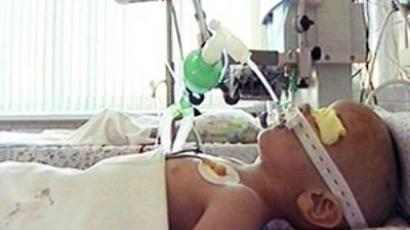Hope of new beginning for underage criminals
A rehabilitation centre in St. Petersburg is using new solutions to help underage offenders re-integrate back into society. It offers an individual approach to every teenager.
The number of underage criminals in Russia has reached record highs. In St. Petersburg alone, more than 28,000 were arrested in 2007. As they are aged 14 and under, there is nothing the law can do, so many are simply given suspended sentences. And despite this brush with the law, they often go on to continue committing crimes.
But what can be done to help? The St. Petersburg Social Rehabilitation Centre for underage criminals is one example.
Opened in 2001, it has no locks on the doors, no bars on the windows and no guards in the corridors. It is not a jail or a camp. It is a place for teenagers that gives them a unique chance to change their lives.
More than fifty teenagers have been through the program since its launch. While that may not sound like much, teachers at the centre spend hours working with each one individually.
Head Teacher Tatyana Saltanova, says there are three ways for the teenage offenders’ to end up here:
“First the judge after the court hearing sends a young criminal to our centre; secondly inspectors can assign young people to us. But most commonly is when a teenager comes by their own will”.
Tatyana believes it is important they are not forced to come by either the courts or their parents.
“I’ve come here myself,” said Igor Rybakov, a participant in the programme. “My friend is here, too. I didn’t want to stay here, but then I understood this centre can really help”.
The programme is divided into three parts and lasts for one hundred days.
The first and most difficult period is the so-called 'quarantine' when a teenager doesn’t go to school, is not allowed to watch TV or listen to music and can make only one telephone call per day in the presence of teachers.
Andrey, another of the programme's participants, was sent to the rehab centre after a court hearing.
“I was given a one year suspended sentence for hooliganism. Now it is the quarantine period in the centre and I can’t go anywhere. It is very difficult to get used to it,” he said.
Within these one hundred days, young criminals remain under the full control of teachers as well as psychologists, but as time passes this control decreases. While successful, there is still room for improvement.
But as the head Teacher says, unfortunately almost twenty per cent of the graduates break the law after leaving our centre.
“We can never predict who it will be,” she said.
The centre was opened with the help of European charity organisations. But since 2002 it also started to receive state support under a programme designed to combat the problem of under aged crime. But the future is not so clear.
“Last year we received quit a big sum of capital from the government,” noted Yulia Nikitina, the head of the Centre. “However, this year we were told that as we remain non-governmental we can no longer rely of state funding. Currently we are looking for ways to get out of this complicated situation”.
Meanwhile, the centre continues to grow. For many teenagers who passed through the programme, this place remains a second home. They continue visiting, but this time helping teachers with the new-comers, and giving first hand accounts of how it can change their lives for the better.













